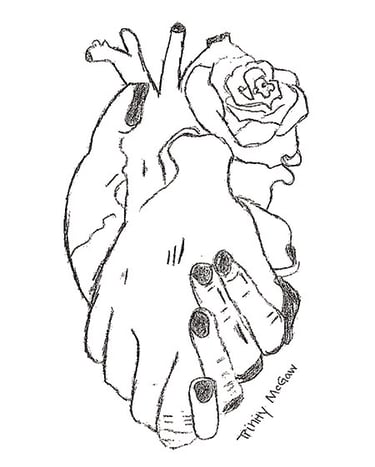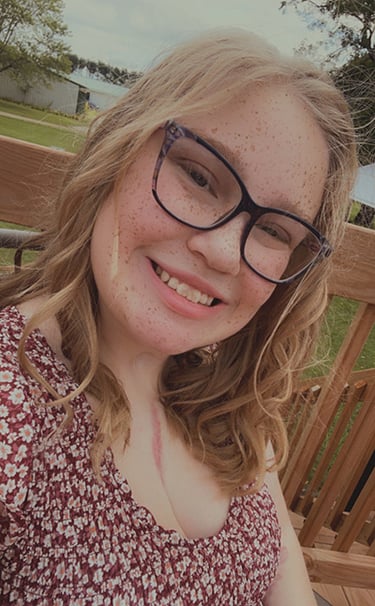
Strength, Endurance and Connection: How Trinity Beat All the Odds
She’s bubbly and bright. Her grandmother describes her as a “busy body.” For those who don’t know her, Trinity is a typical 16-year-old who sleeps until noon, scrolls on her phone and enjoys socializing with friends.
But in October 2021, Trinity was the sickest kid Pediatric Cardiologist David Saudek, MD, had ever seen survive.
“When Trinity came into the hospital with all of her organs shutting down she had a very slim chance of surviving,” said Dr. Saudek.
Before she was born, Trinity was diagnosed at the Children’s Wisconsin Fetal Heart Program with Holt-Oram syndrome, a rare congenital (present at birth) disorder characterized by abnormal bones in a person’s hands, wrists and arms. About 75 percent of people with Holt-Oram syndrome also have a congenital heart defect (CHD) that varies in type and severity. In Trinity’s case, she had truncus arteriosus, a condition that affects less than 1 percent of all people with CHDs.
A typical heart has two main arteries, or trunks — one carries oxygen-rich blood to the body and the other carries oxygen-poor blood to the lungs. People with truncus arteriosus only have one such artery, which causes oxygen-rich and oxygen-poor blood to mix. Trinity’s heart also had a hole between the two lower chambers, known as a ventricular septal defect, or VSD. A hole in the heart allows the mixed blood to circulate through the heart and body, making it difficult for the body to get the oxygen it needs.
Trinity was born very ill on April 17, 2008. In addition to her CHD, her left arm was missing the radius bone, which allows rotation of the forearm and hand, causing her left hand to be turned in. She also only had four working fingers and one small thumb on her left hand.
When she was 8 days old, Trinity underwent her first open-heart surgery, during which surgeons closed the VSD with a patch and inserted a conduit to create a separate pathway and restore proper blood flow to the lungs. As a complication of surgery, Trinity’s diaphragm didn’t work, and doctors placed a tracheostomy to help her breathe.
Trinity was in the hospital for four months after birth, but doctors were able to remove the tracheostomy after only two months.
“Normally, patients will have a tracheostomy for several years,” said Dr. Saudek. “Trinity gained strength, and her lungs improved rapidly. It’s unusual to improve that quickly, but she was able to go home without the tracheostomy.”
Strength — Beating the Odds
 Trinity’s growth and development from a medical perspective continued rather uneventfully for the next few years. She was enrolled in a Birth to 3 program and enjoyed occupational and physical therapy. She had her second open-heart surgery in 2011 at the age of 3 to replace her conduit with a larger one. She enjoyed going to school, was an accomplished artist, and loved being a part of the Big Brothers Big Sisters program of Washington County.
Trinity’s growth and development from a medical perspective continued rather uneventfully for the next few years. She was enrolled in a Birth to 3 program and enjoyed occupational and physical therapy. She had her second open-heart surgery in 2011 at the age of 3 to replace her conduit with a larger one. She enjoyed going to school, was an accomplished artist, and loved being a part of the Big Brothers Big Sisters program of Washington County.
In August 2021, Trinity came back to Children’s Wisconsin for her third open heart surgery — this time for an aortic valve replacement.
“Over time, it’s not unusual for a valve to leak or not open well in patients with truncus arteriosus,” said Dr. Saudek. “Trinity had a routine surgery to remove her aortic valve and replace it with a mechanical valve.”
The surgery was successful, and Trinity went home to school and her friends. But she did notice that she was feeling more tired than usual. So tired, in fact, eventually Trinity didn’t even want to go to school — a feeling she had never had before. Still, she chalked up her fatigue to still recovering from surgery.
In October 2021, with Dr. Saudek’s blessing, Trinity’s grandmother, Sandra, took her to an indoor water park. On the second day, Trinity felt off and thought she was coming down with a cold. Upon returning home, Trinity couldn’t maintain her body temperature and her skin was slowly turning gray. Sandra, a long-time nurse, recognized the symptoms of cardiac shock and drove Trinity to a nearby emergency department (ED).
Doctors at the ED immediately called Children’s Wisconsin. It took physicians more than two hours to stabilize Trinity before they could transport her to the Children’s Wisconsin Milwaukee Hospital. One by one, Trinity’s organs began to shut down — first her heart, followed by her lungs, liver and then kidneys. Trinity was placed in a medically-induced coma because her body was under so much duress. She was also placed on ECMO, a heart-lung support machine, and dialysis for her kidneys.
Four days after her organ failure, Trinity also suffered a blood clot in her right wrist, rendering her right arm paralyzed. After a week on life-continuing devices, doctors began talking with Sandra about how long to continue treatment.
“I told them I was not going to give up,” said Sandra. “Her care team told me to put up pictures of Trinity in her ICU room. I just kept putting those pictures on the wall until her whole room was covered. I needed people to know Trinity and know who they were fighting for.”
And Trinity was not going to be counted out. Doctors were surprised to discover Trinity’s heart doing a little bit of squeezing on its own. That little bit turned into 35 percent function and then 60 percent function. Trinity’s heart kept getting stronger until it was finally able to pump completely on its own.
“Trinity made an absolutely stunning recovery,” said Dr. Saudek.
In total, Trinity had eight surgeries in four weeks and was on kidney dialysis for 10 weeks. Doctors told her she likely wouldn’t be able to go home until April 2022, six months after her organ failure. But Trinity was discharged in half that time. On Dec. 30, 2021, Trinity went home.
Not only did all of Trinity’s organs recover, but she had a complete neurological recovery.
“The doctors were very worried about Trinity’s brain,” said Sandra. “The longer a child is on ECMO or a ventricular assist device, the more likely there will be brain damage, but Trinity had no brain damage and is back to her baseline.”
Endurance — Finding a Will to Live
 Trinity can see now that she had a will to live.
Trinity can see now that she had a will to live.
“I needed to live,” said Trinity. “There’s so much more I need to do.”
But she didn’t always feel that way, and her struggles were far from over. The blood clot she suffered in her right arm during hospitalization caused a nerve injury and she no longer had use of her “good” arm or hand. In addition, after a long and difficult struggle with substance abuse, her mother passed away shortly after Trinity came home from the hospital.
Understandably, Trinity was angry, depressed and questioning why these things were happening to her.
“I kept thinking, ‘Haven’t I been through enough?’” said Trinity. “I felt like I was being punished for some reason. I lost the ability to do art. I couldn’t go to school or be with my friends.”
Dr. Saudek recommended Trinity begin meeting with Licensed Clinical Psychologist, Vanessa Aguilera, PsyD. Dr. Aguilera specializes in working with families whose children have complex medical needs, including congenital heart defects. Dr. Aguilera helped Trinity work through her triggers and develop coping mechanisms.
“Therapy really helped me process my trauma,” said Trinity. “It was nice to have someone from outside of my family to talk to.
In March 2022, Trinity had surgery to amputate the thumb, pinky and three fingertips on her right hand. While she continued occupational and physical therapy to regain motion in her right arm, Trinity also worked faithfully to teach herself how to write and adapt to daily life with her left hand.
In the summer of 2022, Trinity picked up a pencil with her left hand for the first time and drew a pair of hands to give to her hand surgeon.
“That was the first time since my organ failure I drew something,” said Trinity. “I felt like I had found my purpose in life again.”
Today, Trinity has a full range of motion in her right arm. And while she still doesn’t have movement in her right fingers, she can hold a cup with two hands. Doctors aren’t sure if she’ll ever be able to regain movement in her right fingers, but Trinity refuses to give up and continues physical therapy.
Connection — You’re Not Alone
The Herma Heart Institute at Children’s Wisconsin will continue to support Trinity through adulthood. From a heart standpoint, she has no limitations and can run or participate in physical activity as much or as little as she likes.
“For Trinity to be living a generally normal life is remarkable,” said Dr. Saudek. “She is such an unbelievably positive and mentally resilient kid. She does not seem bitter about anything that’s happened to her. She just keeps going.”
To that, Trinity agrees.
“I don’t think there’s much in this world that can stop me from being happy,” said Trinity. “I think I’ll always bounce back.
Trinity refuses to be defined by her challenges.
“Organ failure is such a unique thing to survive,” said Trinity. “I think it’s made me more empathetic because I know what it’s like to hit rock bottom and drag yourself out of it. I look at the things that have happened to me as chapters in my story. They will always be part of the plot, but I’m going to write new chapters. My challenges aren’t who I am.”
If Trinity had to give advice to other kids going through medical difficulties, she would tell them not to give up.
“There are so many people out there just like you,” said Trinity. “You may feel like you’re the only person who looks this way or feels like this, but you’re not. There are tons of kids who are just like you. You are not alone and there’s light at the end of the tunnel.”
Children's Wisconsin Resources

Written by
Jen Novotny
Writer
Related Stories
No related articles found.



